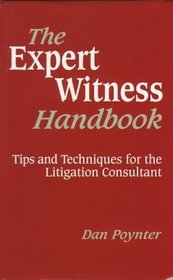Search -
Expert Witness Handbook: Tips and Techniques for the Litigation Consultant (Expert Witness Handbook)
Expert Witness Handbook Tips and Techniques for the Litigation Consultant - Expert Witness Handbook
Author:
Expert Witness Work-A New Profit Center More and more consultants are discovering a new place to sell their expertise: acting as advisors to attorneys in complex legal cases. Lawyers know the law but they can't possibly keep up with every type of business and technology. Consultants are called upon to investigate situations and explain what... more »
Author:
Expert Witness Work-A New Profit Center More and more consultants are discovering a new place to sell their expertise: acting as advisors to attorneys in complex legal cases. Lawyers know the law but they can't possibly keep up with every type of business and technology. Consultants are called upon to investigate situations and explain what... more »
ISBN-13: 9781568600277
ISBN-10: 1568600275
Publication Date: 6/1997
Pages: 287
Rating: ?
ISBN-10: 1568600275
Publication Date: 6/1997
Pages: 287
Rating: ?
0 stars, based on 0 rating
Genres:
- Law >> Law Practice >> Reference
- Law >> Rules & Procedures >> Civil Procedure
- Law >> Rules & Procedures >> Litigation
- Engineering & Transportation >> Law >> Law Practice >> Reference
- Engineering & Transportation >> Law >> Procedures & Litigation >> Civil Procedure
- Engineering & Transportation >> Law >> Procedures & Litigation >> Litigation




